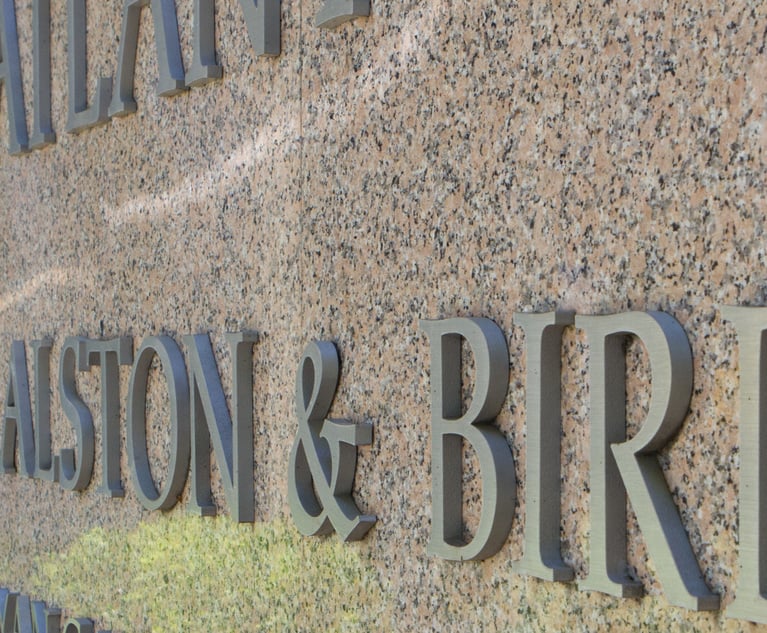 Plaintiff Terry Hodges (left) and Wallace Neel, of the Law Office of Wallace Neel. (Photo: Greg Land/ALM)
Plaintiff Terry Hodges (left) and Wallace Neel, of the Law Office of Wallace Neel. (Photo: Greg Land/ALM)Judge Denies Motion to Strike Defenses in Gordon Rees Legal Malpractice Suit
Fulton State Court Judge Eric Richardson said he was troubled by the changing explanations regarding text messages being sought by the plaintiff, comedian Terry Hodges, but that their absence did not unduly prejudice Hodges' case.
August 15, 2019 at 10:34 AM
4 minute read
The Fulton County judge overseeing a legal malpractice lawsuit against Gordon Rees Scully Mansukhani declined to strike the firm’s defenses as a sanction for text messages alleged to have been deleted that the plaintiff, comedian Terry Hodges, said could help prove his case.
State Court Judge Eric Richardson said he was troubled by the defense’s “problematic” explanations about the texts but that there was not enough evidence that they had been intentionally destroyed—or even existed.
“I have concerns—there is smoke,” said Richardson at the close of a hearing Wednesday afternoon.
But “ultimately, there’s just not enough evidence to prove expoliation of evidence in this case,” said Richardson.
In any case, he said, there is already damning email traffic that “lays out in pretty stark terms” what was going on in 2015, as the defendant firm partners scrambled to dump their former client Hodges after realizing they also represented a defendant he was suing: entertainment giant Netflix.
“We’ve got in the record what the defendants were thinking and saying at the time,” said Richardson. “I don’t see where it substantially prejudices [Hodge’s] case, even if the evidence was destroyed.”
Hodges hired Gordon Rees in 2015 to sue fellow comic Chris Tucker and Netflix, claiming that Tucker owed him for production and writing services and had reneged on a promise to give Hodges co-producer credit for Netflix’s “Chris Tucker Live” movie.
Gordon Rees is accused of concealing that it represented Netflix, then working to have Netflix dismissed from Hodges’ suit before finally dumping him.
Hodges continued the litigation pro se before settling confidentially.
In 2016, he sued the firm along with name partner Paul Mansukhani and partners Charles Mulrain, Richard Sybert and Joni Flaherty.
In May, Hodges’ lawyers, Wallace Neel of New Yorks’ Law Office of Wallace Neel and Roswell solo Warren Hinds, asked Richardson to strike the firm’s defenses as a sanction for discovery abuse and spoliation.
They pointed to filings by the Gordon Rees’ former lawyers testifying that, pursuant to Richardson’s orders, “every law firm partner and every named defendant” had checked their personal devices for messages about Terry Hodges, and that none had been found.
But in depositions earlier this year, it said Sybert and Flaherty testified that they hadn’t searched their personal devices. Mansukhani said he couldn’t recall, then later said he had searched.
Hodges’ motion argued that the texts should have been preserved because they were part of his client file.
On Wednesday, Neel said the defense had been stonewalling and changing its story throughout.
“We’re asking that this conduct be brought to an end,” said Neel. “Gordon & Rees has never taken their responsibilities seriously.”
The firm was on notice as early as 2015 that it was going to be sued, and all evidence should have been preserved, he said.
If the firm escaped unpunished, “they’ll feel like it was worth it, that they got away with it,” Neel said.
Defense attorney Mark Lefkow of Carlock Copeland & Stair said the motion was another ploy in a case marked by “scorched earth” pleadings and tactics.
“There has to be some evidence these tests even existed,” said Lefkow, who represents the firm with Carlock Copeland partner Joe Kingma.
“It is not appropriate to strike our defenses in advance of our motion for summary judgment,” Lefkow said.
In the end, Richardson agreed with the defense.
“I don’t think there’s evidence of bad faith,” he said. “I do think there was notice to preserve this evidence. I just don’t think it has bad faith on it.”
This content has been archived. It is available through our partners, LexisNexis® and Bloomberg Law.
To view this content, please continue to their sites.
Not a Lexis Subscriber?
Subscribe Now
Not a Bloomberg Law Subscriber?
Subscribe Now
NOT FOR REPRINT
© 2024 ALM Global, LLC, All Rights Reserved. Request academic re-use from www.copyright.com. All other uses, submit a request to [email protected]. For more information visit Asset & Logo Licensing.
You Might Like
View All
Georgia Supreme Court Honoring Troutman Pepper Partner, Former Chief Justice
2 minute read

After 2024's Regulatory Tsunami, Financial Services Firms Hope Storm Clouds Break
Trending Stories
- 1'Largest Retail Data Breach in History'? Hot Topic and Affiliated Brands Sued for Alleged Failure to Prevent Data Breach Linked to Snowflake Software
- 2Former President of New York State Bar, and the New York Bar Foundation, Dies As He Entered 70th Year as Attorney
- 3Legal Advocates in Uproar Upon Release of Footage Showing CO's Beat Black Inmate Before His Death
- 4Longtime Baker & Hostetler Partner, Former White House Counsel David Rivkin Dies at 68
- 5Court System Seeks Public Comment on E-Filing for Annual Report
Who Got The Work
Michael G. Bongiorno, Andrew Scott Dulberg and Elizabeth E. Driscoll from Wilmer Cutler Pickering Hale and Dorr have stepped in to represent Symbotic Inc., an A.I.-enabled technology platform that focuses on increasing supply chain efficiency, and other defendants in a pending shareholder derivative lawsuit. The case, filed Oct. 2 in Massachusetts District Court by the Brown Law Firm on behalf of Stephen Austen, accuses certain officers and directors of misleading investors in regard to Symbotic's potential for margin growth by failing to disclose that the company was not equipped to timely deploy its systems or manage expenses through project delays. The case, assigned to U.S. District Judge Nathaniel M. Gorton, is 1:24-cv-12522, Austen v. Cohen et al.
Who Got The Work
Edmund Polubinski and Marie Killmond of Davis Polk & Wardwell have entered appearances for data platform software development company MongoDB and other defendants in a pending shareholder derivative lawsuit. The action, filed Oct. 7 in New York Southern District Court by the Brown Law Firm, accuses the company's directors and/or officers of falsely expressing confidence in the company’s restructuring of its sales incentive plan and downplaying the severity of decreases in its upfront commitments. The case is 1:24-cv-07594, Roy v. Ittycheria et al.
Who Got The Work
Amy O. Bruchs and Kurt F. Ellison of Michael Best & Friedrich have entered appearances for Epic Systems Corp. in a pending employment discrimination lawsuit. The suit was filed Sept. 7 in Wisconsin Western District Court by Levine Eisberner LLC and Siri & Glimstad on behalf of a project manager who claims that he was wrongfully terminated after applying for a religious exemption to the defendant's COVID-19 vaccine mandate. The case, assigned to U.S. Magistrate Judge Anita Marie Boor, is 3:24-cv-00630, Secker, Nathan v. Epic Systems Corporation.
Who Got The Work
David X. Sullivan, Thomas J. Finn and Gregory A. Hall from McCarter & English have entered appearances for Sunrun Installation Services in a pending civil rights lawsuit. The complaint was filed Sept. 4 in Connecticut District Court by attorney Robert M. Berke on behalf of former employee George Edward Steins, who was arrested and charged with employing an unregistered home improvement salesperson. The complaint alleges that had Sunrun informed the Connecticut Department of Consumer Protection that the plaintiff's employment had ended in 2017 and that he no longer held Sunrun's home improvement contractor license, he would not have been hit with charges, which were dismissed in May 2024. The case, assigned to U.S. District Judge Jeffrey A. Meyer, is 3:24-cv-01423, Steins v. Sunrun, Inc. et al.
Who Got The Work
Greenberg Traurig shareholder Joshua L. Raskin has entered an appearance for boohoo.com UK Ltd. in a pending patent infringement lawsuit. The suit, filed Sept. 3 in Texas Eastern District Court by Rozier Hardt McDonough on behalf of Alto Dynamics, asserts five patents related to an online shopping platform. The case, assigned to U.S. District Judge Rodney Gilstrap, is 2:24-cv-00719, Alto Dynamics, LLC v. boohoo.com UK Limited.
Featured Firms
Law Offices of Gary Martin Hays & Associates, P.C.
(470) 294-1674
Law Offices of Mark E. Salomone
(857) 444-6468
Smith & Hassler
(713) 739-1250







